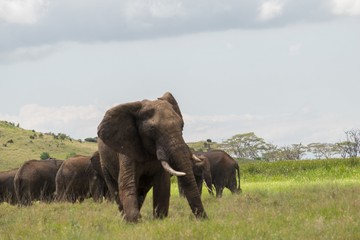Deborah describes her first visit to Kenya with Tusk
Deborah is a patron and special advisor to Tusk, a charity that works in Africa to protect wildlife, particularly endangered species, but also to help alleviate poverty, through sustainable development and education amongst rural communities who live alongside wildlife. Here Deborah describes her first visit to Kenya, to see some of the charity’s work first hand.
My husband Paul and I had spent several harrowing days visiting the slums of Nairobi for Sport Relief, seeing first-hand what can happen when people are forced into leaving their communities in search of a better life. We were ready to visit some of the Tusk projects Charlie had been telling us about, and wanted to see what difference a fundamentally animal based charity could make to the villages and people of the regions they worked in. We also wanted to see the Kenya of Pauls’ childhood and my imagination; the space, the skies, and of course the animals.
Looking out from our aircraft window I had a real sense of how little space was left for wildlife and how great the demands were on the environment, but gradually the city receded and gave way to a parched but massive landscape.
Sarah Watson, Tusk’s projects manager, met us from the plane and drove us through the Lewa Wildlife Conservancy. I was enchanted from the start. Driving through the lush landscape I saw my first wild rhino ever, the first of many as it would turn out, thanks to the protection the Conservancy offers.
Lewa is utterly beautiful and we were immediately made to feel very welcome. Over the next few days we would learn of the amazing work Ian Craig and his wife Jane have done in bringing landowners and communities together to create conservancies, huge swathes of land, originally dotted through the northern rangelands territories but now joined up, where wildlife is valued and protected through rigorous monitoring and patrolling and where the local communities have been taught to understand the direct benefits wildlife conservation brings.
On an early morning visit to the headquarters Paul was persuaded to be bait for Toffee, the bloodhound, exercising the skills she uses to track down poachers with amazing accuracy and speed. Paul was rewarded with a surprise breakfast set up on the edge of a watering hole amongst grazing zebras and very inquisitive ostrich; Toffee got biscuits!
Amid the game drives and sightings of leopard, cheetah, rhino and the rare Grevy’s zebra were reminders of the importance of the work that Tusk carries out and the projects it supports. A simple water project funded by Tusk at Rugusu on the edge of the Conservancy had completely changed the lives of the local community .The new water pumping station uses the force of the water to deliver clean water for drinking, provides wash stations and even encourages entrepreneurial drive - .with the water now literally on tap, the community had set up a nursery to sell trees to other communities. The compound was spotless and well-tended despite the huge numbers of people and animals it served. They were clearly proud of it.
Far too soon we were preparing to leave Lewa when a call came in to Lewa reporting that Mountain Bull, a large male elephant, was injured, probably shot in conflict with humans whilst wandering through the local community land. Ian and Mike Watson could help and so we loaded up, jumped into the helicopter and landed at Borana, the neighbouring conservancy to Lewa. We watched Ian and the Lewa team with the help of the Kenya Wildlife Service vet dart Mountain Bull in order to clean the wound and pump it full of antibiotics. We left, hoping that they had done enough. We have since learned that they had and that Mountain Bull, has made a good recovery.
With crossed fingers for Mountain Bull we flew towards the very beautiful Sarara lodge in the Namunyak Conservancy, stopping at the Westgate and Sera Conservancies on the way. At Sera, we were proudly shown a new water tank, filled with water pumped by solar power from the river 15kms away. As we landed, what appeared to be a deserted, dusty village slowly became a lively, chattery colourful throng. The whole village had turned out to see us climb up onto the tank and peer down into the black wet hole that had done so much to change the lives of these people.
As we travelled through the northern territories we were heartened to see how the local communities embrace the ‘Conservancy’ model and it became clear to us that this circular model is probably the most sustainable way forward. On a trip to a village close to the Ethiopian border, we witnessed the Chief Tribesmen pleading to become part of a conservancy, having seen the lives of their neighbours improving beyond recognition.
We left and flew south across the Rift Valley, flying over Lake Nakuru and on to the Maasai Mara where we landed at another Tusk funded project, the Maasai guiding school at Koiyaki. We were met and shown around by Ron Beaton, founder of the school and were immediately struck by the number of women in the classroom, very unusual and encouraging in such a male-orientated culture. There was so much learning taking place on so many levels - conservation, tourism, societal shifts, environment protection and pride of their heritage and country. We were also lucky to have the time with Ron, to hear of his pioneering work with the Maasai. In our three days at Rekero Tented Camp we spent our days spell-bound by the wildlife and our evenings talking with Jackson Looseiya, co-presenter of the BBC’s Big Cat Diary, over the camp fire and we came to understand what a magical place the Mara is and how important the work with the Maasai is to protect it.
We went home and thought about Africa. We saw that through Tusk and the amazing people it works with that there is a deep understanding of the local issues and that the future lies with the protection of the wildlife through its people. We saw how the Tusk projects guide and encourage these people. We left Africa with a head stuffed full of sights, smells and sounds but more importantly, we left Africa with more hope than we’d arrived.



